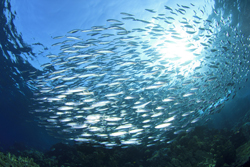Managing small fry in the Mediterranean
Sardines and anchovy, so-called small pelagic fish, are an important marine resource. Disturbances in their biomass affect upper trophic layers, in particular predators. Sardines also form an important part in the fisheries of some regions. Sustainable management within this trophic level is crucial to prevent a major upheaval in marine food webs. Drawing up management policies means a thorough understanding of stock assessment and fishery management of pelagic fish. To fill existing knowledge gaps, the EU-funded project 'Improving assessment and management of small pelagic species in the Mediterranean' (Sardone) has just completed a comprehensive study on anchovy and sardine in the northwest Mediterranean, Adriatic and Aegean seas. Sardone scientists used acoustic methods and satellite environmental data to characterise and identify essential habitats for juveniles, nursery areas. Data was entered into a database and analysed using statistical modelling to pinpoint environmental conditions affecting juvenile distribution. Information on nursery areas provided valuable information for workshops on predicting recruitment and to agree on common protocols for stock management. For study of larval stages, a special tool was developed by the Sardone team to estimate biomass. Another similar tool is able to simulate the advection or horizontal transfer of eggs and larval stages from spawning areas using hydrodynamic models. Project scientists also made advances in fishing gear design to help selectivity of the catch. Existing towed fishing gear selectivity was defined and improved and equipment adapted to the Italian fishing fleet. Able to separate different species during the process, its performance could be enhanced by use in combination with instruments to detect and therefore focus on pelagic schools. results of the Sardone project represent a very comprehensive overhaul of information for sustainable fishing of pelagic fish. Not only is this good news for the marine ecosystem and the fishing industry but consumers who enjoy a plate of delicious, inexpensive, nutritious oily fish stand to benefit too.







